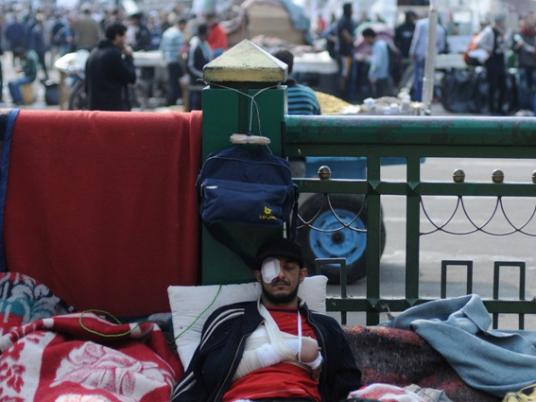
As millions headed to cast their votes in Monday’s parliamentary elections, protesters in Tahrir Square – the epicenter of the revolution – spent the day differently.
The demonstrators, who have been partaking in an open-ended sit-in in the square for more than 11 days, were largely opposed to the polls and opted to boycott. They demand an end to military rule.
Those in the square kicked off their sit-in last week in the wake of violence that took place in Mohamed Mahmoud Street. They call for the prosecution of officials for committing crimes against demonstrators, of whom 42 were killed and scores injured last week in clashes between security forces and protesters.
Meanwhile, people protested in front of the cabinet building against the appointment of Kamal al-Ganzouri as prime minister. Ganzouri, a former member former President Hosni Mubarak’s regime, is tasked with creating a national salvation government. The Tahrir protesters perceive him as the SCAF’s puppet.
“Why vote for a parliament that cannot withdraw confidence from the government if need be?” said Laila, a protester. “The military council is looking for an excuse to stay in power.”
For Adel Ibrahim, any election under SCAF is void by default. “The elections are null because SCAF is illegitimate,” he said.
“Tantawi committed murder in Maspero and now he will create a rift between the people and the army, and he needs to go before that happens. He should leave peacefully. The people in Tahrir are saying we are hunters and patience is our game.” At least 28 were killed on 9 October when the army brutally crushed a mostly Coptic march to the Maspero State TV building.
Adel Ahmed Abdalla, who was injured on 28 January, views the elections with scorn. “The elections are the biggest farce in Egyptian history,” he said.
“Ask people here about the system and the parties and they couldn't tell you. Who will I vote for? SCAF wanted to do it now because people don't understand how it works. The annulled votes will be numerous. People in Tahrir are with the elections and many voted but elections cannot be held under SCAF rule. All agree to elections but not under SCAF.”
Some are opposed to the elections on the basis that it lacks security. “How can you secure thousands of stations when you cannot contain a fight in Waily (a workers neighborhood)?” asked Montasir Hussein, a demonstrator in the square.
“It’s not the time for elections.”
Incidentally, there were few reports of violence as elections proceeded on Monday.
For others, voting is an important act of political participation that does not contradict the act of sitting-in in Tahrir.
“I went to cast my vote and come back,” said Husseini, a protester. “And I’m not leaving until the military council steps down and hands over power to a civilian presidential council.”




